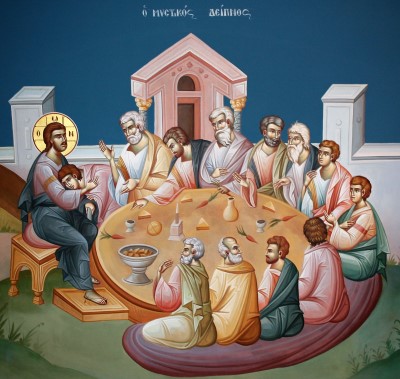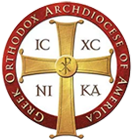Preparation For Holy Communion
Every Sunday is a special day, it is the Lord’s Day. It is the day when we gather as a family to worship and celebrate Christ’s presence among us in the Holy Eucharist. It is when the Church as the people of God, the Body of Christ, is truly realized, and we become sacramentally what God intended us to be: united to Him in faith and love, and through Him, to one another. It is in love and faith and worship that we are truly members of the Church.
From this standpoint, one can more clearly see that a local parish lives up to its true task and is a most genuine expression of the Church when its activity and its life center on the heart of the matter, true membership, expressed in faith, love, and worship. This is the ideal which each parish, and each Orthodox Christian holds before him.
One very important way of striving toward this ideal is preparation for and partaking of Holy Communion, the purpose for which the Divine Liturgy is celebrated. In our churches everywhere this Sacrament as well as the Sacrament of Holy Confession or Penance, are always touchstones of personal and parish renewal.
Orthodox Christians receive Holy Communion no less than four (4) times a year; Christmas, Easter, the Feast of the Holy Apostles (June 29), and the Feast of the Falling Asleep of the Theotokos (August 15). In every Divine Liturgy, however, the faithful are expected to approach and receive the Lord. Christian Orthodox should approach the Holy Chalice and receive the precious Body and Blood of Christ as often as possible following proper preparation, not just three or four times a year (See Jn. 6:53-58, Mt. 26:26-28, 1 Cor. 11:17-34).
What of the preparation for Holy Communion? The best preparation is itself spiritual and has to do with our inner self, our soul and its disposition. Thinking that we are to take Communion is obviously the most important part, accompanied by a sincere effort to examine our life, its goals, values, aspirations, and characteristics. Where am I going? What are my values and priorities? What do I hold most dear? These are some of the questions one should ponder. How tremendous if parents would discuss some of the questions with their children!
Secondly, heartfelt prayer is an essential pre-requisite to preparing for Holy Communion. Nothing prepares the soul for receiving Christ as much as sincere prayer, asking God for His forgiveness and thanking Him for all the many blessings and gifts He bestows upon us. This is most effective when accompanied by a firm resolve to live a renewed Christian life.
Finally, there is fasting – meaningless without points one and two above. Fasting is both a means of self-discipline and a tangible reminder that one is indeed to receive Christ in Holy Communion. We have been taught many things about fasting. Unfortunately, many of our beliefs about fasting fall short of the true canonical practice of preparation for Holy Communion in that we forget that fasting and prayer must go hand in hand.
Each of us has been taught various things about “Fasting”. We have been told so many things that we tend to neglect everything we have been taught completely. The Orthodox Church, regarding man as a unity of soul and body, has always insisted that the body must be trained and disciplined, as well as, the soul. The Orthodox Christian understanding of fasting is based upon Holy Scripture.
We read in Genesis 2:15-3:24 that Adam and Eve were directed by the Lord God to fast from the tree of the knowledge of good and evil. They chose to disobey God and since they did not keep this simple fast, they were expelled from Paradise.
In the New Testament we see that Christ is the New Adam. In His earthly ministry, Christ set the example of fasting for all of us to follow. Christ experienced temptation and hunger, but He did not sin. He kept the fast! In Luke 5:33-35, we see how the Jewish leaders asked Christ why His disciples were not fasting. The Lord responded, “The days will come, when the bridegroom is taken away from them, and then they will fast in those days.” From this we learn that following His Passion, Christians would be expected to fast. In obedience to the Lord, this is why we fast!
People fast for different reasons. The most common fast can be considered “earthly”, rather than “spiritual”. People fast to lose weight or they fast for health reasons. Of course, these things also happen when one fasts, but these are not the spiritual reasons for fasting. The purpose of a spiritual fast is to overcome the passions. “A passion is anything that has control over us, be it over-eating, smoking, watching too much television, lustful thoughts, gossiping, etc., etc., etc. All of these things captivate the soul, subjecting the man created in the image and likeness of God to things that are earthly.” If one truly desires to overcome such passions, one must allow fasting and prayer to go hand in hand.
Another reason for fasting is to grow closer to God. The Orthodox living process called Theosis teaches us to be illumined and transfigured by God. We see this in the following passages from Holy Scripture: 1.) Exodus 24:18, Moses fasted for 40 days and stood in the presence of God and conversed with Him; 2.) In 3 Kings 19:8, Elias the Prophet also fasted 40 days before speaking with God on Mt. Horeb; 3.) Matthew 4:1-17, Jesus fasted 40 days and 40 nights and overcame the temptation of the devil before He began His public ministry; 4.) In Acts 10:10, Peter was in a state of hunger and fasting when he received a revelation from God; 5.) Acts 13:2 and 14:22, the Apostles received guidance from the Holy Spirit when they were fasting; and 6.) In Matthew 17:21, the Lord scolded His disciples for attempting to act in His name without prayer and fasting.
In the first century text entitled, “The Teaching of the Apostles”, or Didache, we find instruction for fasting on Wednesdays and Fridays. The Christian Orthodox faithful fasts on Wednesday, because Judas betrayed Christ on this day and Friday, because our Lord was crucified on that day. Whenever we act contrary to the Lord’s teachings, we too betray Him! St. Seraphim of Sarov said, “One who does not observe the fasts is not a Christian, no matter what he considers or calls himself.”
Fasting is also a necessity when preparing oneself for Holy Communion. One should not eat or drink anything from the time one goes to sleep the night before he plans to partake of the Holy Eucharist. By receiving Holy Communion, we literally receive God Himself, “Truly, truly, I say to you, unless you eat the flesh of the Son of man and drink His blood, you have no life in you; he who eats my flesh and drinks my blood has eternal life,…” (John 6:53-54) Upon partaking of Holy Communion we are illumined by divine grace and the actual presence of God within us transforms us — body and soul! Therefore, our preparation for Holy Communion is not only spiritual, involving the soul through repentance, Holy Confession, and prayer, but also physical by fasting.
Here are some common questions many ask about fasting:
“Besides Wednesdays (the day Judas betrayed Christ), and Fridays (the day of our Lord’s crucifixion), when are we supposed to fast?” There are four fast periods throughout the year: 1.) Great Lent; 2.) Apostles’ Fast, Monday after the week following Pentecost and ends on June 29, Feast of Ss. Peter and Paul; 3.) Dormition Fast, August 1-14; and 4.) Christmas Fast, which begins November 15 and ends Christmas Day. The fast before the great feasts is intended to familiarize us with the great events we celebrate and prepare us spiritually for the celebration of these events. During these fasts which have been established by the Church, all who are able to fast should fast, whether they are going to take Holy Communion or not!
“How do we fast?” The Holy Fathers of the Church teach that the best kind of fast is a simple fast. “Fasting has to always be tempered by obedience: one does not decide for himself how he will fast, but must always fast only with the blessing of his Spiritual Father.”
“What do we eat?” On fast days one may eat the normal number of meals or fewer meals but seldom do we do without food altogether. The thing we do is to change the types of food we eat. On fast days we abstain from meat or meat products, dairy products (eggs, milk, cheese, etc.), fish, all alcoholic beverages including wine, and oil. What one does eat is fruit and vegetables. When preparing food for fast days it should be simple rather than rich. This does not mean that the food should taste terrible, but it should not be a gourmet meal either. The reason for eating is to nourish the body and this should be remembered. The Fathers teach that we should always leave the table feeling a bit hungry since too much food removes the desire to pray.
Always remember to keep the spirit of the fast, not just the rules. On fast days we are to pray and reflect upon our lives and the stewardship we offer to God. Besides prayer, we must also practice almsgiving, i.e., helping those in need. In the book of Isaiah the Prophet, chapter 58:3-8, we are warned about proper fasting.
Bishop Kallistos of Diokleia, a professor at Oxford University and convert to the Orthodox Christian Faith, writes in his Introduction to the “Lenten Triodion”: “Here utmost care is needed, so as to preserve a proper balance between the outward and the inward . On the outward level, fasting involves physical abstinence from food and drink, and without such exterior abstinence a full and true fast cannot be kept; yet the rules about eating and drinking must never be treated as an end in themselves, for ascetic fasting has always an inward and unseen purpose. Man is a unity of body and soul, ‘a living creature fashioned from natures visible and invisible’ (Lenten Triodion: Vespers for Saturday of the Souls); and our ascetic fasting should therefore involve both of these natures at once. The tendency to over-emphasize external rules about food in a legalistic way, and the opposite tendency to scorn these rules as outdated and unnecessary, are both alike to be deplored.”
Let us remember the guidelines of fasting laid down by our Lord and Savior Jesus Himself, Who said: “And when you fast, do not look dismal, like the hypocrites, for they disfigure their faces that their fasting may be seen by men. Truly, I say to you, they have received their reward. But when you fast, anoint your head and wash your face, that your fasting may not be seen by men but by your Father who is in secret; and your Father who sees in secret will reward you.” (Matthew 6:16-17).
Orthodoxy insists on a strict fast before Communion, and nothing can be eaten or drunk after the previous midnight. In cases of sickness or genuine necessity, a Father Confessor can grant dispensations from this communion fast. The night before receiving Holy Communion one should read the Communion prayers, retire early, avoiding social engagements. Before going to church, children ask their parents for forgiveness, and parents, likewise, ask forgiveness of their children. Whether preparing to receive Holy Communion or not, we should not eat or drink anything prior to attending the Divine Liturgy. The Divine Liturgy is our invitation to partake of the Lord’s banquet and we are to receive the Holy Gift, in other words, Holy Communion, or the “antidoron”, which means, “instead of the Gift”.



